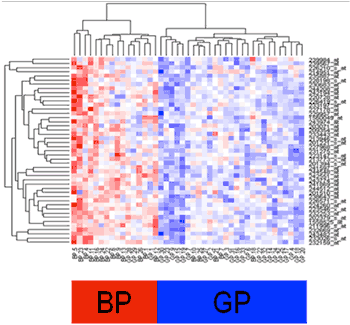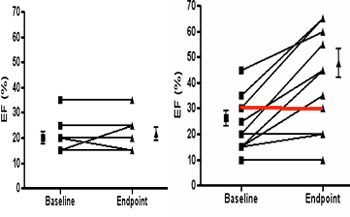
|
Microarray transcriptomic analysis reveals a gene signature that predicts with a high degree of accuracy a Good Prognosis (“GP”) long term event free survival as compared to a Bad Prognosis (“BP”) manifesting as death or need for heart transplantation within 2 years. (From Heidecker B, et. al: Transcriptomic biomarkers for individual risk assessment in new-onset heart failure. Circulation 118:238-246, 2008. Copyright 2008, American Heart Association).
Patients with gene signature predicting favorable outcome undergo reverse remodeling and have dramatic improvements in ejection fraction. (From Heidecker B, et. al: Transcriptomic biomarkers for individual risk assessment in new-onset heart failure. Circulation 118:238-246, 2008. Copyright 2008, American Heart Association).
|
HeartGen5YPHeart Genomics’ 5 Year Prognosis Diagnostic Test (HeartGen5YP) is a laboratory based test performed at a CLIA facility that analyzes heart tissue from biopsies and then provides a score (the “5YP Score”), accurately telling the patient and physician whether the patient has a “Bad Prognosis (BP)” or “Good Prognosis (GP)” for the 5 year period. The test provides an accurate diagnosis, enabling the physician to make individualized, optimal therapeutic decisions for patients with heart failure due to cardiomyopathy. If the HeartGen5YP indicates a bad 5 year prognosis, both the patient and physician can intervene to improve the patient’s outcome probabilities. This information can help decisions about listing the patient for heart transplantation, implanting an artificial device or considering the use of experimental therapies. A good prognosis 5YP Score can provide reassurance that conventional medications and lifestyle modification can lead to years of good quality of life and fewer hospitalizations to treat heart failure exacerbations. The HeartGen5YP enables better and more accurate treatment decisions that will not only improve patients lives and prevent unnecessary treatments, but can also cut healthcare costs. For example, many heart failure patients presenting with an ejection fraction of 25% or less frequently receive an empiric defibrillator. As the 5YP Score can predict EF improvement, it can potentially obviate the need for a defibrillator. It is possible, therefore, that the HeartGen5YP test could allow more effective tailoring for a decision to implant a defibrillator. HeartGen5YP’s MSA-based approach has undergone initial validation in clinical Proof-of-Concept studies, validating its accuracy in determining the 5-year prognosis of heart failure patients. HeartGenMYOThe HeartGenMYO is a laboratory based test performed at a CLIA facility that detects whether a patient has myocarditis.iv Myocarditis is a form of inflammation of heart muscle that afflicts 30% of new heart failure cases. Importantly, myocarditis is treatable and potentially reversible. The endomyocardial biopsy is the gold standard method of diagnosis. Pathological inspection requires multiple biopsies and can still be inaccurate. The HeartGenMYO diagnoses myocarditis from a single biopsy with substantially increased accuracy. The increased certainty can help guide tailored therapy for inflammatory heart disease. HeartGenMYO’s MSA-based approach has undergone initial validation in clinical Proof-of-Concept studies, validating its accuracy in diagnosing myocarditis. The HeartGenMYO study was chosen in March 2012 by the editors of Circulation Heart Failure as one of the Most Important Papers in Pathopysiology and Genetics, stating: [this technology] can substantially improve the diagnostic accuracy of heart biopsy for myocarditis…[and] provide treating physicians with important and accurate diagnostic information about individual patients and could provide tools for personalized treatment or monitoring. Given emerging treatment strategies for viral and inflammatory myocarditis, accurate diagnostic tools are of increased importance. The editors concluded that: these findings demonstrate that transcriptomic biomarkers from a single endomyocardial biopsy can improve the clinical detection of patients with inflammatory diseases of the heart. This approach advances the clinical management and treatment of cardiac disorders with highly variable outcome.
|

